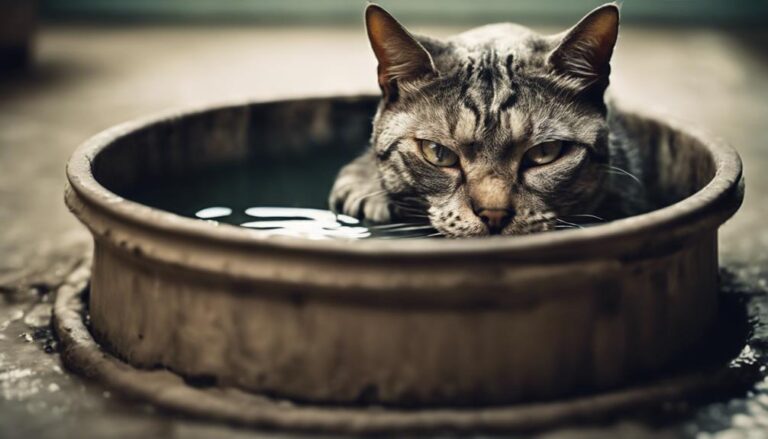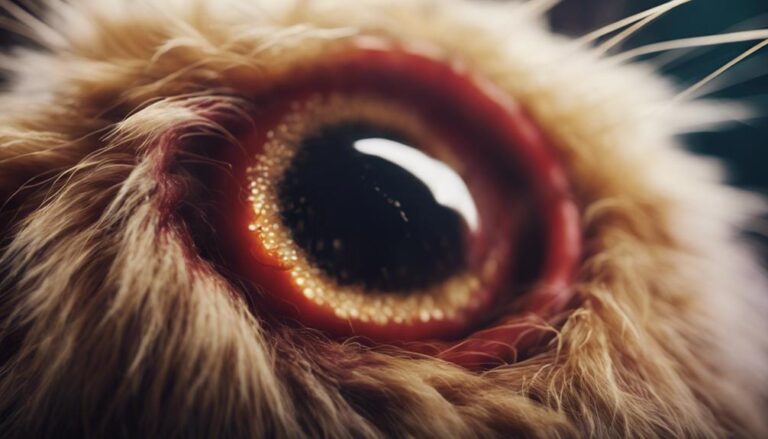If you have ever wondered how to safeguard your furry companion from pesky mosquitoes, there are various effective methods you can explore. From specialized bug repellents formulated for pets to natural alternatives like essential oils and plant-based sprays, the options are diverse. But, there's one crucial factor many pet owners tend to overlook when it comes to mosquito prevention for their cats or dogs. So, what might this missing piece be, and how can it significantly impact your pet's protection against these blood-sucking insects?
Bug Repellent Products for Pets
When it comes to keeping mosquitoes away from your pets, using bug repellent products specifically formulated for animals is essential. Veterinary-formulated bug repellents like Vectra 3D for dogs and K9 Advantix II provide safe and effective mosquito protection for specific age groups of dogs. These products are designed to be pet-friendly and offer a reliable defense against pesky bugs.
Safe plant-based options such as Vets Best Flea and Tick Spray offer natural alternatives that are safe for pets, making them a great choice for repelling mosquitoes without harsh chemicals. Additionally, essential oils like tea tree, neem, and citronella can be used as bug repellents, focusing on natural ingredients to keep your pets protected.
While off-label repellents like EQyss Premier Marigold Spray may not be EPA approved, they can still be effective when applied correctly on dogs, especially against flies and mosquitoes. Incorporating mosquito-repelling plants like basil, catnip, lavender, and peppermint in your pet's environment can also help create a safer space by deterring mosquitoes naturally.
Natural Plant-Based Repellents
Explore the effectiveness of natural plant-based repellents in keeping mosquitoes away from your pets. Natural mosquito repellents like basil, catnip, lavender, and peppermint offer a pet-safe solution for repelling mosquitoes.
Basil plants contain compounds that effectively deter mosquitoes, while catnip is incredibly potent, being 10 times more effective than DEET. The pleasant aroma of lavender plants acts as a natural mosquito deterrent, providing a fragrant way to keep pests at bay.
Peppermint plants not only repel mosquitoes but also ward off ants and cockroaches, offering a multi-functional pest control option for your pets. These plant-based repellents aren't only effective in repelling mosquitoes but also add greenery and natural scents to your surroundings, creating a pleasant environment for both you and your pets.
Consider incorporating these natural repellents into your pest control routine to help protect your furry friends from pesky mosquito bites.
Mosquito-Repelling Plants
To effectively protect your pets from mosquitoes, consider planting mosquito-repelling plants like basil, catnip, lavender, and peppermint in your garden or around your home. These plants not only serve as a natural mosquito deterrent but also provide a safe option for keeping your pets free from insect bites.
Basil, with its four mosquito-repelling compounds, is a reliable and pet-friendly choice to ward off mosquitoes effectively. Catnip, known to be 10 times more potent than DEET, offers a strong natural defense against mosquitoes for your furry friends.
The pleasant aroma of lavender acts as a natural mosquito repellent, creating a soothing environment while keeping mosquitoes at bay. Additionally, peppermint plants not only repel mosquitoes but also deter ants and cockroaches, providing a multi-functional solution to safeguard your pets from various insects.
Yard and Home Prevention Tips
To keep mosquitoes at bay from your pets, start by planting mosquito-repelling plants and ensuring there's no standing water in your yard. These simple steps can significantly reduce the mosquito population around your home and protect your pets from itchy bites.
Take proactive measures to create a comfortable outdoor environment for your pets by following these yard and home prevention tips.
Plant Mosquito-Repelling Plants
Consider enhancing your yard and home's defense against mosquitoes by strategically planting mosquito-repelling plants like basil, catnip, lavender, and peppermint. Basil contains compounds that effectively repel mosquitoes, while catnip is 10 times more effective than DEET.
The aroma of lavender acts as a natural mosquito repellent, and peppermint not only repels mosquitoes but also deters ants and cockroaches. These plants not only add greenery to your surroundings but also serve as a natural way to keep mosquitoes at bay.
Remove Standing Water
To safeguard your pets from mosquitoes, take proactive measures by eliminating standing water around your yard and home. Mosquitoes are attracted to standing water for breeding, increasing the risk of mosquito bites on your pets.
Ensure you check and clean outdoor containers like tires and buckets regularly to prevent mosquitoes from laying eggs in them. Cover these containers with lids or screens to deter mosquito breeding in your yard.
Properly maintain swimming pools with chemicals to repel mosquitoes and reduce the likelihood of breeding. By eliminating standing water, you force mosquitoes to relocate, effectively reducing the mosquito population around your pets and creating a safer environment for them.
Safe Outdoor Practices
You can ensure your outdoor area is pet-friendly by exploring safe repellent options and setting up proper outdoor shelter for your pets.
These practices will help create a comfortable and mosquito-free environment for your furry friends to enjoy the outdoors.
Remember to prioritize your pet's safety and well-being when implementing these outdoor measures.
Pet-Friendly Repellent Options
For effective protection against mosquitoes, consider using pet-friendly repellent options that are safe for outdoor use.
When looking for mosquito repellents for your dogs, opt for veterinary-formulated products like Vectra 3D or K9 Advantix II, specifically designed for canine use. These products are safe for dogs over certain age limits and can be applied directly to the skin to effectively repel mosquitoes.
Additionally, you can explore natural repellent options such as plant-based sprays like Vet's Best Flea and Tick Spray or EQyss Premier Marigold Spray, which are safe for dogs and proven to be effective against mosquitoes.
Creating a pet-friendly environment by planting mosquito-repelling herbs like basil, catnip, lavender, and peppermint can also help naturally deter mosquitoes from your outdoor space and protect your furry companions.
Proper Outdoor Shelter Setup
Consider setting up a screened shelter to provide a bug-free outdoor space for your pet, keeping mosquitoes at bay. Ensure the shelter has proper ventilation for your pet's comfort.
Use pet-safe mosquito repellents or natural alternatives within the shelter to enhance protection. Place the shelter in a shaded area to prevent overheating and create a more comfortable environment.
Regularly clean and maintain the shelter to keep it free of pests and ensure a hygienic space for your pet. By following these steps, you can establish a safe and enjoyable outdoor area for your cat or dog, free from the nuisance of mosquitoes.
Avoiding Harmful Repellents
To protect your pets from potential harm, it's crucial to steer clear of using DEET-containing products as they can be toxic and harmful. When looking for mosquito control options for your furry friends, always check the ingredients of bug repellents to ensure they're safe for pets.
Opt for veterinary-formulated repellents like Vectra 3D or K9 Advantix II, which are specifically designed to provide effective protection without posing risks to your pets' health. Additionally, consider natural alternatives such as essential oils like tea tree, neem, and citronella, which are known for being pet-friendly repellents that can help keep mosquitoes at bay.
However, be cautious and stay away from garlic-based products, as they can be harmful and potentially lead to anemia in pets. By choosing the right products and avoiding toxic ingredients, you can effectively protect your pets from mosquitoes while keeping them safe and healthy.
Consulting Your Vet
Your vet can provide valuable recommendations on safe and effective mosquito repellents for your furry companion. Consulting with your vet ensures that the repellent is suitable for your pet's age, size, and health condition. This personalized advice takes into account any specific requirements or sensitivities your cat or dog may have. Vets can also provide guidance on the proper application of mosquito repellents to ensure maximum effectiveness and safety for your pet.
Additionally, your vet can advise on alternative methods to keep mosquitoes away from your cat or dog if you prefer not to use repellents. These alternatives may include environmental modifications or natural remedies that can help reduce mosquito exposure for your pet. Seeking advice from your vet is crucial in choosing the best mosquito control strategies tailored to your pet's individual needs. Remember, your vet is your best resource for ensuring the well-being and comfort of your furry friend when it comes to mosquito protection.
Frequently Asked Questions
How Do I Keep Mosquitoes Away From My Cat?
To keep mosquitoes away from your cat, use cat-safe repellents like Vet's Best Flea and Tick Spray, plant mosquito-repelling plants, and consult a vet before applying any repellents. Keep your cat indoors during peak mosquito hours for protection.
How Do I Protect My Dog From Mosquitoes?
To protect your dog from mosquitoes, apply veterinary-approved repellents like Vectra 3D or K9 Advantix II on their skin. Utilize safe plant-based options such as Vets Best Flea and Tick Spray. Create a bug-free environment with natural mosquito-repelling plants.
Is There a Mosquito Repellent for Cats?
For cats, specific mosquito repellents are limited. Consult a vet before using dog repellents, as cats react differently. Safer options like citronella or lemon juice can help. Avoid DEET or permethrin, harmful to felines.
Why Are Mosquitoes Attracted to My Cat?
Mosquitoes are attracted to your cat due to its body heat, breath, and carbon dioxide emissions. These signals draw mosquitoes seeking a blood meal. Your cat's fur and body odor can further entice mosquitoes looking for a host.






